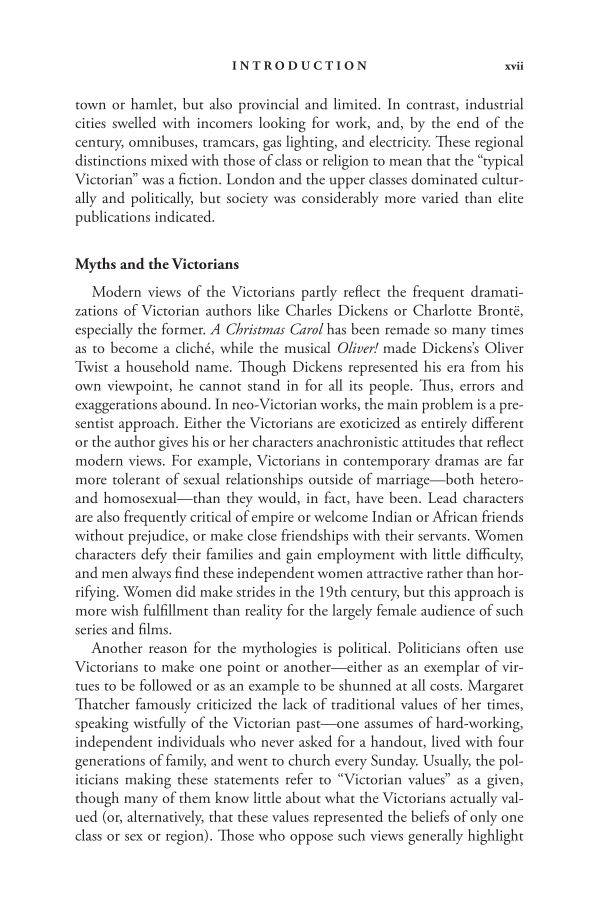I n tr o d u cti o n xvii town or hamlet, but also provincial and limited. In contrast, industrial cities swelled with incomers looking for work, and, by the end of the century, omnibuses, tramcars, gas lighting, and electricity. These regional distinctions mixed with those of class or religion to mean that the “typical Victorian” was a fiction. London and the upper classes dominated cultur- ally and politically, but society was considerably more varied than elite publications indicated. Myths and the Victorians Modern views of the Victorians partly reflect the frequent dramati- zations of Victorian authors like Charles Dickens or Charlotte Brontë, especially the former. A Christmas Carol has been remade so many times as to become a cliché, while the musical Oliver! made Dickens’s Oliver Twist a household name. Though Dickens represented his era from his own viewpoint, he cannot stand in for all its people. Thus, errors and exaggerations abound. In neo-Victorian works, the main problem is a pre- sentist approach. Either the Victorians are exoticized as entirely different or the author gives his or her characters anachronistic attitudes that reflect modern views. For example, Victorians in contemporary dramas are far more tolerant of sexual relationships outside of marriage—both hetero- and homosexual—than they would, in fact, have been. Lead characters are also frequently critical of empire or welcome Indian or African friends without prejudice, or make close friendships with their servants. Women characters defy their families and gain employment with little difficulty, and men always find these independent women attractive rather than hor- rifying. Women did make strides in the 19th century, but this approach is more wish fulfillment than reality for the largely female audience of such series and films. Another reason for the mythologies is political. Politicians often use Victorians to make one point or another—either as an exemplar of vir- tues to be followed or as an example to be shunned at all costs. Margaret Thatcher famously criticized the lack of traditional values of her times, speaking wistfully of the Victorian past—one assumes of hard-working, independent individuals who never asked for a handout, lived with four generations of family, and went to church every Sunday. Usually, the pol- iticians making these statements refer to “Victorian values” as a given, though many of them know little about what the Victorians actually val- ued (or, alternatively, that these values represented the beliefs of only one class or sex or region). Those who oppose such views generally highlight
Document Details My Account Print multiple pages
Print
You have printed 0 times in the last 24 hours.
Your print count will reset on at .
You may print 0 more time(s) before then.
You may print a maximum of 0 pages at a time.




























































































































































































































































